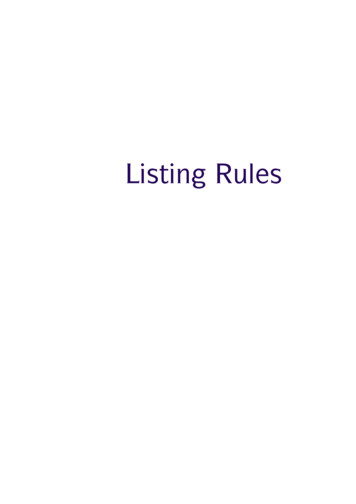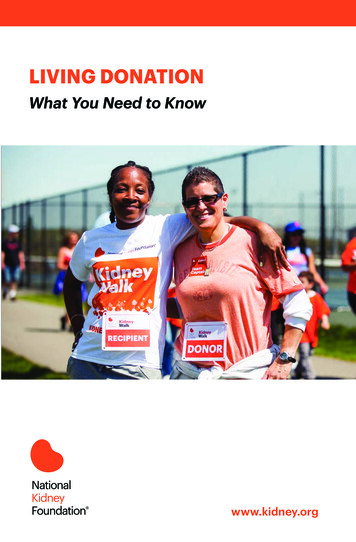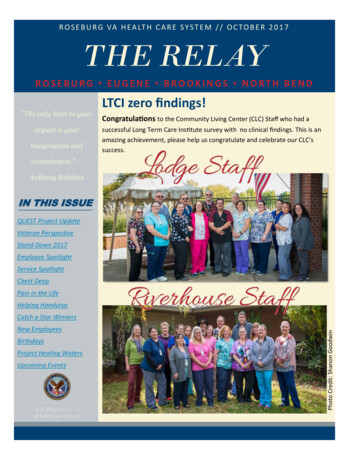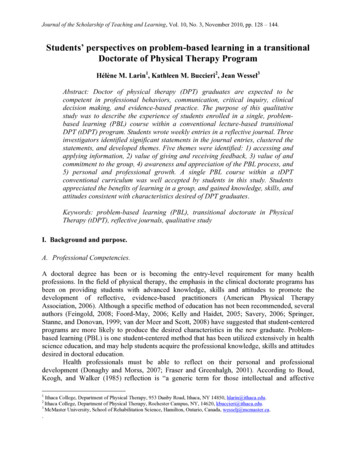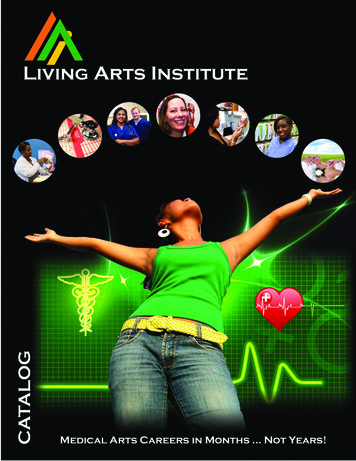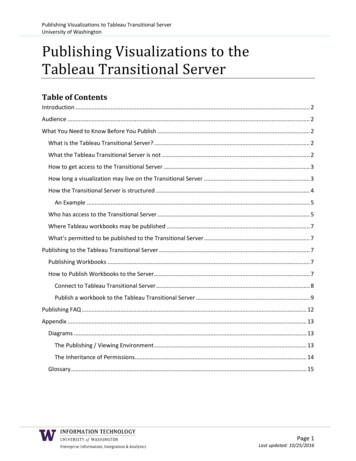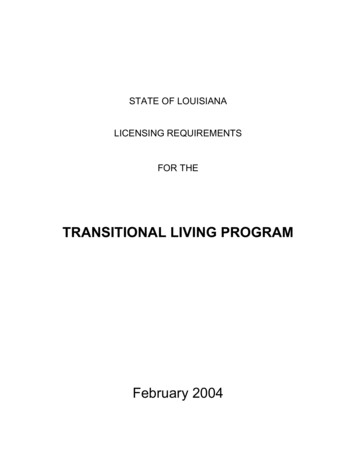
Transcription
STATE OF LOUISIANALICENSING REQUIREMENTSFOR THETRANSITIONAL LIVING PROGRAMFebruary 2004
TRANSITIONAL LIVINGTransitional living is defined as a program to provide transitionalcare, supervision, vocation and education training, guidance andcounseling, for youth between the ages of 16 and 21 who are fostercare children in the custody of the Office of Community Services,living in their own apartments (congregate or individual) to assistthem in making the transition to adult living.2
TRANSITIONAL LIVING6201. PURPOSEIt is the intent of the legislature to provide for the care and to protect the health,safety, and well being of youths in the custody or formerly in the custody of thestate of Louisiana, who are nearing the age of majority and who, by reason ofage, are unlikely to be placed with foster families for adoption. The legislaturerecognizes that such youth are likely to remain in need of supervision andservices, even after reaching the age of majority, to assist them in making thetransition from child foster care to independent adulthood. It is the purpose ofthis policy to establish a system of licensed facilities to care for such persons upto the age of 22; to establish statewide minimum standards; to ensure themaintenance of those standards; and to regulate conditions in these facilitiesthrough a program of licensing and inspection.6203. AUTHORITYAct 726 of the 2001 Regular Session directs the Department of Social Services,Bureau of Licensing to develop and publish minimum standards for licensingtransitional youth residences. The Bureau shall review such standards and, ifnecessary, revise and amend them at least once every six years.6205. WAIVERSThe Secretary of the Department of Social Services may waive compliance withany standard if the intent of the standard is being met and if the health, safety,and well being of the persons in care are not affected.6207. APPLICATION FOR LICENSUREA.An application for a transitional youth residence license shall be made bythe provider to:Department of Social ServicesBureau of LicensingP. O. Box 3078Baton Rouge, LA 70821B.There shall be an annual licensing fee of 200 for each transitional youthresidence caring for six or fewer youths; 400 for each transitional youthresidence caring for at least seven but less than 11 youths; and 600 foreach transitional youth residence caring for 12 or more youths.C.The Department of Social Services, Bureau of Licensing has the power todeny, revoke, or refuse to renew a license for a transitional youth3
residence if the applicant has failed to comply with the provisions of thispolicy.D.Upon the refusal of the Bureau of Licensing to grant or renew a license orupon the revocation of a license, the applicant or licensee shall have theright to appeal such action by submitting a written request within 10 daysof the receipt of the notification of the refusal or revocation to:Bureau of AppealsP. O. Box 2944Baton Rouge, LA 70821The appeal hearing shall be held no later that 30 days after the request.E.Whoever operates a transitional youth residence without a valid license orin violation of this policy after being notified of such violation and beinggiven an opportunity to correct such violation, shall be fined not less than 75 or more than 250 for each day of such offence. The Department ofSocial Services may file suit in the District Court for the parish in which thefacility is located for injunctive relief.6209. DEFINITIONSAbuse – the infliction of physical or mental injury on an individual by other parties,including but not limited to such means as sexual abuse, exploitation, or extortionof funds or other things of value, to such an extent that his/her health, selfdetermination, or emotional well-being is endangered.Administrator – the owner or the manager designated by the governing body asresponsible for the management, administration, and supervision of the program.DSS - means the Department of Social Services.Documentation – written evidence or proof, signed and dated.Human Services Field - means psychology, sociology, special education, rehabilitationcounseling, juvenile justice, corrections, nursing, etc.Shall or must - indicates mandatory standards.Transitional youth residence - means any communal or supervised independent livingarrangement existing for the primary purpose of providing care for at least two,but less than twenty, youths living in individualized apartment units, alone orjointly with other youths, under the supervision, custody or control, directly orindirectly, of the Office of Community Services.4
Transitional youth residence program - means a program of services, includingcounseling, guidance, vocational or education training, and supervision foryouths living in transitional youth residences.Transitional living – a program to provide care, supervision, vocation and educationtraining, guidance and counseling for youth between the ages of 16 and 21 in thecustody or formerly in the custody of the Office of Community Services, living intheir own apartments (congregate or individual) to assist them in making thetransition to adult living.6211. INSPECTIONSA.The Department of Social Services, Bureau of Licensing shall inspect atregular intervals not to exceed one year, or deemed as necessary by theBureau, and without prior notice, all transitional youth residenceadministrative offices subject to the provisions of this policy. The facilityshall be open to inspection by authorized DSS personnel during workinghours or at all times when youths are in care.B.The Bureau shall also investigate all complaints except those allegingabuse against a youth resident and those concerning the prevention andspread of communicable diseases. The Bureau may take such action asis authorized in the law.6213. GENERAL REQUIREMENTSA.A provider shall allow designated representatives of DSS in theperformance of their mandated duties to inspect all aspects of a provider'sfunctioning which impact the youth and to interview any staff member oryouth.B.A provider shall make available to DSS any information that the provider isrequired to have under the present requirements and any informationreasonably related to assessment of compliance with these requirements.C.A provider will furnish adequate space for the representatives of DSS towork.6215. GOVERNING BODYA.A provider shall have an identifiable governing body with responsibility forand authority over the policies and activities of the program. The provider,whether it is a corporation, partnership or association, shall identify thenames and addresses of its members and officers and shall, whereapplicable, have a charter, partnership agreement, constitution, andarticles of association or by-laws.5
B.A provider shall have documents identifying all members of the governingbody; their addresses; their terms of membership; any officers of thegoverning body; and terms of office of any officers.C.When the governing body of a provider is composed of more than oneperson, the governing body shall hold formal meetings at least twice ayear.D.When the governing body is composed of more than one person, aprovider shall have written minutes of all formal meetings of the governingbody and by-laws specifying frequency of meetings and quorumrequirements.E.A private provider shall have documentation of its authority to operateunder state law.F.The provider’s governing body shall:1.ensure the provider's compliance and conformity with the provider'scharter;2.ensure the provider's continual compliance and conformity with allrelevant federal, state, local and municipal laws and regulations;3.ensure that the provider is adequately funded and fiscally sound;4.review and approve the provider's annual budget;5.designate a person to act as director and delegate sufficientauthority to this person to manage the facility;6.formulate and annually review, in consultation with the director,written policies concerning the provider’s philosophy, goals, currentservices, personnel practices, and fiscal management;7.annually evaluate the director’s performance;8.have the authority to dismiss the director;9.meet with designated representatives of DSS whenever required todo so;10.inform designated representatives of DSS prior to initiating anysubstantial changes in the services provided; and6
11.ensure that the director or a person authorized to act on behalf ofthe director shall be accessible to staff or designatedrepresentatives of DSS at all times.6217. ACCOUNTINGA provider shall not permit public funds to be paid, or committed to be paid, toany person to whom any of the members of the governing body, administrativepersonnel, or members of the immediate families of members of the governingbody or administrative personnel have any direct or indirect financial interest, orin which any of these persons serve as an officer or employee, unless theservices or goods involved are provided at a competitive cost or under termsfavorable to the facility. The provider shall have a written disclosure of anyfinancial transaction with the facility in which a member of the governing body,administrative personnel, or his/her immediate family is involved.6219. ADMINISTRATIVE FILESA.The provider shall maintain records that cover the basic administrativerequirements of running a facility.B.The administrative files shall include at least:1.an organizational chart of the provider;2.all leases, contracts and purchase-of-service agreements to whichthe provider is a party;3.insurance policies issued in the name of the provider that includecommercial comprehensive liability and coverage for any ownedand non-owned vehicles utilized to transport clients;4.annual budgets;5.master list of all social service providers and other contractors usedby the provider.6221. PROGRAM DESCRIPTIONA.A provider shall have a written program description describing:1.the overall philosophy and approach to supervised transitionalliving;2.the long-term and short-term goals;7
B.3.the types of youth best served;4.the provider’s approach to service planning;5.ongoing programs available to the youth during placements; and6.any living arrangements provided.The provider must include a written description of direct services, supportservices, and services to be arranged to achieve the goals of thetransitional living program.1.Direct services shall include, but are not limited to, the following:a.services related to education and vocational training e.g.: b.career planning;preparation for the GED or higher education;job readiness;job search assistance;job placement;job follow-up activities;vocational training;tutoring and other remedial educationprograms and services in basic independent living skills e.g.: money management;home management (housekeeping, etc.);consumer skills;identifying community resources;time management;communication skills;use of transportation;physical and mental health care;locating safe and stable housing;problem solving/decision making;sex education;menu planning and nutrition;cooking.8
c. individual and/or group counseling as well as workshops andconferences to promote: 2.self-esteem;self confidence;development of interpersonal and social skills;preparation for transition to independence andtermination of services;after care.Support services shall include, but not be limited to, the following: vocational assessment or training;GED classes;preparation for college entrance exams;driver’s education, if appropriate;counseling.6223. RECORDSA.A provider shall ensure that all entries in records are legible, signed by theperson making the entry, and accompanied by the date on which the entrywas made.B.All records shall be maintained in an accessible, standardized order andformat and shall be retained and disposed of in accordance with statelaws.C.A provider shall have sufficient space, facilities and supplies for providingeffective record keeping services.6225. CONFIDENTIALITY AND SECURITY OF FILESA.A provider shall have a written policy and procedure for the maintenanceand security of records specifying who shall supervise the maintenance ofrecords, who shall have custody of records, and to whom records may bereleased. Records shall be the property of the provider and he/she, ascustodian, shall secure records against loss, tampering, or unauthorizeduse.B.A provider shall maintain the confidentiality of all youths’ case records.Employees of the provider shall not disclose or knowingly permit thedisclosure of any information concerning the youth or his/her familydirectly or indirectly, to any unauthorized person.9
C.When the youth is of majority age or emancipated, a provider shall obtainthe youth's written informed permission prior to releasing any informationfrom which the youth or his/her family might be identified.D.When the youth is a minor, a provider shall obtain written informedconsent from the legally responsible person prior to releasing anyinformation from which the youth might be identified.E.A provider shall, upon request, make available information in the caserecord to the youth, the legally responsible person, or legal counsel of theyouth.F.A provider may use material from case records for teaching or researchpurposes, development of the governing body's understanding andknowledge of the provider's services, or similar educational purposes,provided that names are deleted and other identifying information aredisguised or deleted.G.A provider shall not release a personnel file without the employee’spermission except in accordance with state law.6227. STAFFING REQUIREMENTSA.There shall be a director responsible for the day-to-day administration ofthe program who has at least a bachelor’s degree in a human servicefield, one year of experience relative to the population being served, and isat least 21 years of age. Documentation of director’s qualifications shallbe on file.B.There shall be a qualified professional who will have the responsibility forsupervising the client’s individual service plan. This person shall have atleast a bachelor’s degree in a human service field and one year ofexperience relative to the population served (one person can serve in thecapacity as director and qualified professional).C.A provider shall employ a sufficient number of qualified staff and delegatesufficient authority to such staff to carry out the responsibilities theprovider undertakes and to adequately perform the following:1.2.3.4.5.6.administrative functions;fiscal functions;clerical functions;direct youth service functions;supervisory functions;record keeping and reporting functions;10
7.8.social service functions;ancillary service functions.D.A provider shall ensure that all staff members are properly supervised,certified and/or licensed as legally required.E.A provider shall ensure that there is staff immediately accessible to theyouth 24 hours a day seven days a week.6229. STAFF PLAN AND PRACTICESA.A provider shall have a written plan for recruitment, screening, orientation,on-going training, development, supervision, and performance evaluationsof staff members.B.There shall be written job descriptions for each staff position.C.The provider shall have a written employee grievance procedure.6231. PERSONNEL FILEA.A provider shall have a personnel file for each employee which shallcontain:1.the application for employment and/or résumé;2.three reference letters from former employer(s) and personalreferences or phone notes on such references to assess applicant’squalifications;3.criminal record clearance;4.evidence of applicable professional credentials/certifications;5.job description;6.annual performance evaluations;7.personnel actions, reports and notes relating to the individual’semployment with the provider;8.employee’s starting and termination dates;9.driver’s license to operate a vehicle used to transport clients (ifapplicable).11
B.The staff member shall have reasonable access to his/her file and shall beallowed to add any written statement he/she wishes to make to the file atany time.6233. ORIENTATIONA.A provider’s orientation program shall provide at least 16 hours of trainingfor all direct service workers within one week of the date of employment toinclude the following topics:1.philosophy, organization, program, practices and goals of theprovider;2.instructions in the specific responsibilities for the employee’s job;3.implementation of the transitional living plan;4.emergency and safety procedures including medical emergencies;5.detecting and reporting suspected abuse and neglect;6.reporting critical incidents;7.rights of youth;8.crisis de-escalation and management of aggressive behavior;9.assistance with self-administration of medications;10.universal precautions;11.methods of facilitating youth development training;12.issues of adolescents and young adults.B.A new employee shall sign a statement of understanding certifying thatsuch training has occurred.C.A new employee shall not be given sole responsibility for theimplementation of the service plan until training is completed.D.Each employee having direct care responsibilities shall have current firstaid certification that shall be obtained within the first 30 days ofemployment.12
6235. TRAININGA.A provider shall ensure that each direct service worker participated in anannual review of all the orientation topics.B.Current first aid certification shall be obtained for employees having directcare responsibilities.6237. STAFF COMMUNICATIONSA.A provider shall establish procedures to assure adequate communicationamong staff to provide continuity of services to the youth. Writtendocumentation shall be maintained.B.Any employee of a provider working directly with youth in care shall haveaccess to information from the youths’ case records that is necessary foreffective performance of the employee’s assigned tasks.6239. EXTERNAL PROFESSIONAL SERVICESA provider shall, as necessary, give assistance to youth in obtaining any requiredprofessional services not available from employees of the facility.6241. ADMISSION POLICYA.B.A provider shall have a written description of an admission policy that shallinclude the following information:1.written description of the admission criteria as provided to allplacing agencies;2.the age and sex of the youth to be served by the provider;3.the needs, problems, situations or patterns best addressed by theprovider;4.pre-admission skills and other criteria for successful participation inand completion of the program; and5.criteria for discharge as well as the termination of admissionagreement.A provider shall not refuse admission to any youth on the grounds of race,color, sex, religion, national origin, handicap, or any non-merit factor inaccordance with all state and federal guidelines.13
C.A provider shall not accept any youth whose needs cannot be adequatelymet by the provider.6243. SERVICE AGREEMENTA.The provider shall ensure that a written service agreement is completedprior to placement. A copy of the agreement, signed by the provider, theyouth, if applicable the legally responsible party and all those involved inits formulation, shall be kept in the youth’s record and a copy shall beavailable to DSS, the youth, and where appropriate, the legallyresponsible person.B.The service agreement shall include:1.a delineation of the respective roles and responsibilities of theprovider and where applicable, the referring agency;2.specification of all services to be provided including the plan forcontact between the youth and provider staff;3.facility rules that will govern continued participation in thetransitional living program, and consequences of inappropriatebehavior of youth while in care;4.the provider’s expectations concerning the youth and the youth’sresponsibility;5criteria for discharge;6.specification of financial arrangements including any fees to be paidby the youth;7.authorization to care for the youth;8.authorization for medical care;9.attendance and absences from the provider to also include curfewtimes; and10.the criteria for notifying the funding agency of any change ofaddress of the youth and any significant change in the youth’s lifeor program.14
6245. SERVICE PLANNINGA.B.A provider shall make every effort to ensure that service and programplanning for each youth is a comprehensive process involving appropriateprovider staff; representatives of the referring agency; where appropriate,representatives of other significantly involved agencies; the youth; whereappropriate, the legally responsible person; and any other personsignificantly involved in the youth's life on an ongoing basis.1.The director, qualified professional, or a designated staff whomeets the director qualifications, shall be responsible for thecoordination and development of the transitional living plan.2.A provider shall ensure the youth is in attendance during thedevelopment of his/her transitional living plan.Following acceptance of a youth, a provider shall conduct an assessmentof his/her transitional living skills and annually thereafter. The assessmentshall include the following:1.life safety skills including ability to access emergency services,basic safety practices and evacuation of the living unit;2.physical and mental health care; (i.e. health maintenance,scheduling physician appointments);3.recognizing when to contact a physician;4.money management, budgeting, and consumer awareness (i.e.paying bills, shopping, food management, sources of income,credit);5.self-administration of medication;6.stated purpose and possible side effects of medications prescribedfor the youth and other common prescription and non-prescriptiondrugs and other drug use;7.career planning/career interests;8.use of transportation (i.e. ability to access public transportation,learning to drive, obtaining insurance);9.social skills;15
C.10.daily living skills (i.e. housekeeping, cooking, personal appearance,and grooming skills);11.vocational / job skills / job seeking skills (i.e. employmentexperience, training);12.identifying community resources;13.education (i.e. current grade level; education goals/expectations/plans);14.locating housing;15.problem solving/decision making;16.time management (punctuality and attendance);17.communication skills;18.parenting skills;19.legal issues, knowledge of legal rights; and20.use of recreation and leisure time.On the basis of the transitional living skill assessment, a provider shall,within one month of placement, formulate a transitional living plan for theyouth. The plan shall include:1.the youth’s long term goals;2.time-limited, measurable objectives addressing training in skillareas identified as needs;3.the type and frequency of supervision needed;4.the identification of roles and responsibilities of all personsinvolved (youth, provider, and others) in the implementation of theplan;5.the life skills and the criteria necessary for achieving a successfuldischarge; and6.the preliminary plan for discharge and aftercare.16
D.The plan shall be reviewed monthly and shall be revised whenevernecessary. A written progress report shall be completed.6247. YOUTH’S CASE RECORDA.A provider shall have a written record for each youth that shall include:1.the name, sex, race, birth date and birthplace of the youth; addressof youth’s current place of employment, school or other serviceproviders;2.other identification data including court status and legal status,identifying who is authorized to give consent;3.youth's history including, where applicable, family data, educationalbackground, employment record, prior medical history and priorplacement history;4.the service agreement;5.written authorization signed by the youth or, when appropriate thelegally responsible person for emergency medical care;6.written authorization signed by the youth or, when appropriate theperson legally responsible for managing the youth's money;7.assessment of the youth’s independent living skills;8.a copy of the youth’s individual service plan and any modificationsor updates of the service plan;9.monthly progress reports;10.the names, addresses and phone numbers of the youth’s physicianand dentist;11.psychological and psychiatric evaluation, if applicable;12.dates of admission and discharge;13.signed acknowledgement of Rights and Grievance procedures; and14.incident reports.17
B.A provider shall maintain health records on a youth including:1.a description of any serious or life threatening medical condition ofthe youth;2.a description of any medical treatment or medication necessary forthe treatment of any serious or life threatening medical conditiontogether with the provider's provisions for ensuring the youth'saccess to such medication or treatment;3.current medications; and4.report of general medical examination by a physician within a yearprior to admission and annual exams; and5.dental exams.6249. ACCOUNTING FOR YOUTH’S MONEYA.A provider shall have a written policy describing how they will manage theyouth’s money.B.A provider shall only accept a youth's money when such management ismandated by the youth’s service plan. The provider shall manage andaccount for money of youth who are minors.C.Providers who manage youth’s money shall maintain in the youth’s file acomplete record accounting for his/her money.1.The provider shall maintain a current balance sheet containing allfinancial transactions to include the signature of staff and the youthfor each transaction.2.The money shall be kept in an individual account in the name of theyouth.6251. SUPERVISION AND SUPPORTA.A provider shall have a written plan for providing support and supervisionto youth in transitional living situations. This plan shall ensure:1.regular contact between provider personnel and the youth daily andat least two face-to-face visits weekly in the youth’s apartment. Ayouth may not be seen less than the above amount unless18
specified by his/her plan, which has been signed by the parent orlegal guardian;B.2.all contacts with the youth shall be documented; and3.provisions for emergency access by youth to an appropriateprovider staff member on a 24-hour basis.A provider shall, through at least monthly visits by staff to the livingsituation, determine and document that:1.there is no reasonable cause for believing that the youth's mode oflife or living situation presents any unacceptable risks to the youth'shealth or safety;2.the living situation is maintained in a clean and safe condition;3.the youth is receiving any necessary medical care;4.the current provider plan provides appropriate and sufficientservices to the youth.6253. RIGHTS AND GRIEVANCE PROCEDURES FOR YOUTHA.The provider shall have a written policy on youths’ rights. A copy will begiven to the youth to review and sign. The signature page will bemaintained in the youth’s record. The policy shall assure the youth:1.are free from physical or psychological abuse or neglect, and fromfinancial exploitation;2.are able to consult freely and privately with his/her parent(s) orlegal guardian(s);3.are able to possess and use personal money and belongings;4.are actively and meaningfully making decisions affecting his/herlife;5.are allowed to have privacy;6.are allowed visits to and from his/her family and friends;7.are not required to work without compensation;8.are treated with dignity and respect;19
B.9.are provided due process;10.have access to records, including information about their finances;11.participate in self-directed service planning which is developed andmodified timely;12.are provided adequate and appropriate assistance in mealplanning;13.shall not be deprived of any civil or legal rights, benefits, orprivileges guaranteed by law or the Constitution of the UnitedStates;14.shall not be denied admission to a program, segregated, ordiscriminated against on the basis of race, sex, handicap, creed,national background or ancestry, sexual orientation, political beliefs,or any other non-merit factor;15.are provided access to professional and specialized services, asappropriate;16.shall be free from mental, emotional, and physical abuse andneglect and assured that no chemical restraints will be used;17.shall be allowed to participate in religious services in accordancewith his/her faith, but shall not be forced to attend religiousservices;18.shall be encouraged and assisted to exercise rights as a citizen; tovoice grievances;19.shall be free to consult with legal counsel of their choice;20.are allowed to meet with representatives of the Bureau of Licensingas well as other state officials.The provider shall have a written grievance policy and procedures foryouth designed to allow them to make complaints without fear ofretaliation. The youth shall be informed of the advocacy servicesavailable.1.The provider shall make every effort to ensure that all youth areaware of and understand the grievance procedure.20
2.C.The youth’s records shall contain a record of any grievances andtheir resolutions.The provider shall develop written procedures for a Youth Advisory Boardconsisting of youth representatives receiving services to provide feedbackrelative to program policies, practices, and services.1.The Youth Advisory Committee shall be allowed to meet at leastmonthly.2.The provider shall maintain documented minutes of the YouthAdvisory Board and resolutions of problems addressed.6255. REPORTING OF CRITICAL INCIDENTS AND ABUSE AND NEGLECTA.B.A provider shall have a written policy and procedures for the reporting anddocumentation of unusual incidents and other situations or circumstancesaffecting the health, safety or well being of the youth (i.e. accident or injuryto the youth, unexplained overnight absences, death, fights or physicalconfrontations, suspected incidents of abuse or neglect, etc.).1.Such procedures shall ensure timely verbal reporting to the directoror designee and a preliminary written r
Transitional living is defined as a program to provide transitional care, supervision, vocation and education training, guidance and counseling, for youth between the ages of 16 and 21 who are foster care children in the custody of the Office of Community Services, living in their own apartments (congregate or individual) to assist
